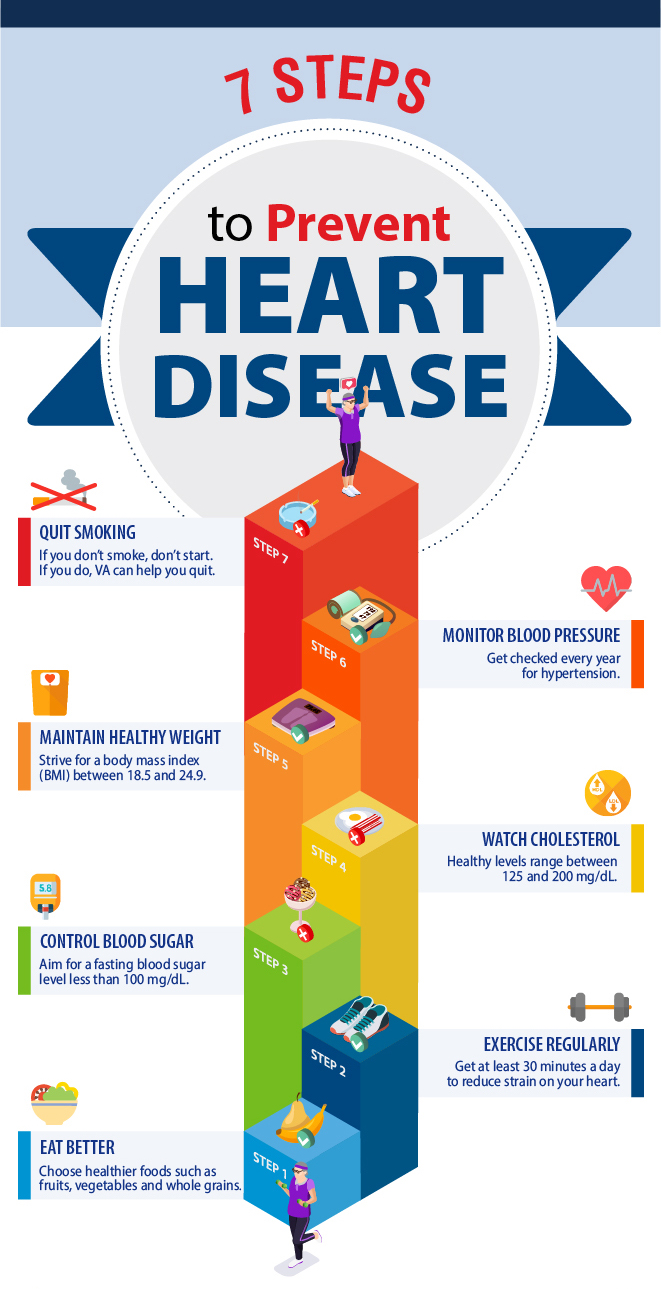Cardiovascular disease prevention is a crucial aspect of maintaining overall health, as heart disease continues to be the leading cause of death in the United States. Despite this alarming fact, many individuals remain complacent about taking proactive measures. Experts stress the importance of heart disease awareness, emphasizing that early heart disease detection can save lives. Effective cholesterol management, alongside lifestyle changes, plays a pivotal role in preventing heart disease and improving cardiovascular health. By embracing a proactive approach and utilizing cardiovascular health tips, individuals can significantly reduce their risk and pave the way for a healthier future.
The prevention of heart-related ailments is an essential focus for maintaining wellness, especially considering the alarming rates of heart conditions in today’s society. As many people overlook the signs of cardiovascular complications, there is a pressing need for increased education on this topic. Recognizing the importance of proactive strategies, such as regular screenings and effective cholesterol control, can lead to improved health outcomes. Implementing a robust plan to prevent cardiovascular issues involves understanding the nuances of early detection and adopting healthier habits. Ultimately, making informed decisions about cardiovascular health can empower individuals to combat the prevalence of heart disease.
Understanding Cardiovascular Disease Prevention
Cardiovascular disease (CVD) is increasingly recognized as a silent threat, often underestimated by the general populace. Experts emphasize that prevention should start early, and understanding one’s cardiovascular health is essential for long-term wellbeing. Many make the mistake of waiting until symptoms appear before they take action, but cardiovascular disease can develop over decades, often without noticeable signs. This viewpoint highlights the importance of routine screenings and proactive measures, such as monitoring weight, blood pressure, and cholesterol levels, to prevent heart disease before it becomes life-threatening.
Moreover, patients must shift their perception of cardiovascular disease from being a manageable issue to understanding its severity as a leading cause of death. Doctors like Jorge Plutzky advocate for awareness around LDL (‘bad’) cholesterol, which is a significant risk factor for heart disease. Engaging patients in a conversation about their numbers can empower them to take control of their health, fostering the mindset that prevention is not merely an option, but a necessity.
The Importance of Early Heart Disease Detection
One of the core principles of effective cardiovascular health is early detection of heart disease. As emphasized by medical professionals, the awareness that heart disease starts long before symptoms are apparent is crucial. Regular screenings and awareness of cholesterol levels and blood pressure can lead to timely interventions. Early detection might involve lifestyle modifications or medication to manage cholesterol, significantly reducing the risk of severe complications later.
Besides routine check-ups, innovative technologies and wearable devices are also transforming how we monitor heart health. These devices allow individuals to track their heart rate, activity levels, and even blood pressure from the comfort of their homes. Such innovations play a vital role in early detection by alerting both patients and physicians to potential health issues before they escalate into serious concerns.
Strategies like educational campaigns aimed at improving heart disease awareness are pivotal in altering public perception. By promoting the significance of early detection, these initiatives can inspire proactive health measures and encourage individuals to adopt healthier lifestyles, thus preventing heart disease effectively.
Cholesterol Management for Heart Health
Effective cholesterol management is a cornerstone of any strategy aimed at preventing heart disease. High levels of LDL cholesterol significantly increase the risk of cardiovascular issues and therefore should be closely monitored. The importance of understanding one’s cholesterol numbers cannot be overstated, as early recognition of elevated LDL levels can lead to timely lifestyle changes and medical interventions. Patients often express skepticism about cholesterol-lowering medications, yet the benefits of statins and lifestyle improvements can vastly reduce the risk of heart disease.
Furthermore, dietary modifications such as increasing fiber intake, reducing saturated fats, and incorporating regular physical activity can have a profound impact on cholesterol levels. Patients are encouraged to take an active role in managing their cholesterol by consulting their healthcare providers about the best strategies tailored to their individual needs, thus directly contributing to their cardiovascular health.
Heart Disease Awareness Campaigns
Boosting heart disease awareness through targeted campaigns is vital for enhancing public understanding and promoting preventive healthcare. These initiatives aim to dispel myths surrounding heart disease and inform the public about its risks, especially among younger populations who may not perceive it as an immediate threat. By employing various platforms—social media, community events, and informational literature—these campaigns effectively engage individuals and encourage them to be more proactive in their health management.
Community workshops and seminars can also provide valuable knowledge about recognizing the symptoms and risk factors associated with heart disease. This educational approach ensures that individuals are not only aware of the need for screenings and lifestyle changes but also feel empowered to advocate for their health. Increased awareness ultimately translates to higher screening rates and better management of risk factors, forming a more health-conscious society.
Cardiovascular Health Tips for Everyday Life
Maintaining cardiovascular health involves a combination of lifestyle choices that cumulatively contribute to heart wellness. Simple daily routines such as incorporating physical activity into one’s day, whether through walking, cycling, or participating in sports, are essential. Exercise does not only help with weight management but also plays a critical role in improving cardiovascular health by reducing LDL cholesterol and blood pressure.
Equally important is nutrition; adopting a heart-healthy diet rich in fruits, vegetables, whole grains, and lean proteins can drastically improve heart health. Understanding the balance of nutrients and the impact of certain foods can guide individuals in making choices that lower their risk of cardiovascular disease. By making these modest lifestyle adjustments, individuals can significantly enhance their quality of life and lower their chances of developing heart-related illnesses.
The Role of Technology in Cardiovascular Care
Recent advancements in technology are revolutionizing cardiovascular care and prevention. Mobile health applications can assist individuals in tracking key health metrics such as blood pressure and cholesterol levels, fostering a culture of accountability and self-care. These tools enable users to set health goals, receive reminders, and even consult with healthcare professionals, thereby facilitating a more engaged approach to health management.
Additionally, technologies like telemedicine and AI-driven health assessments are making it easier for patients to seek help remotely. This accessibility can lead to quicker interventions and more timely discussions about lifestyle changes or medications needed to improve cardiovascular health. By embracing these technologies, we can empower patients to take charge of their health, leading to better outcomes in preventing cardiovascular diseases.
Dietary Approaches to Prevent Heart Disease
A heart-healthy diet can have a profound impact on preventing cardiovascular disease. Consuming a variety of nutrient-rich foods, focusing on whole grains, lean proteins, healthy fats, and plenty of fruits and vegetables, is paramount. These dietary choices not only help in managing cholesterol and blood pressure but also reduce inflammation and promote overall cardiovascular health. Education about what constitutes a healthy diet can enhance compliance and encourage individuals to make heart-smart choices.
Moreover, reducing sodium intake and limiting processed foods are crucial factors in cultivating better heart health. Patients and consumers alike need guidance on reading labels and understanding portion sizes. Community-based programs focused on providing nutritional education and cooking classes can also empower individuals to make healthier food choices, thus aiding in the fight against heart disease.
Engaging Communities for Heart Health Support
Community engagement plays a significant role in promoting cardiovascular health and preventing heart disease. Local initiatives can create an environment where individuals feel supported in making healthier lifestyle choices. From exercise groups to heart-healthy cooking classes, community programs can motivate people to participate in activities that promote cardiovascular wellness.
Additionally, fostering partnerships with local health organizations can enhance the resources available to residents. By providing access to screenings and consultations, communities can address cardiovascular health issues more effectively. This collective approach not only raises awareness but also builds a support network that encourages individuals to prioritize their heart health and stay informed about preventive measures.
Innovations in Cardiovascular Disease Treatment
Recent breakthroughs in treatment options for cardiovascular disease underscore the significance of continuous innovation in medical care. From minimally invasive surgeries that shorten recovery times to revolutionary heart transplant techniques, the landscape of cardiovascular care is evolving. These advancements not only improve immediate patient outcomes but also lay the groundwork for more effective prevention strategies in the future.
Moreover, innovations in pharmacology are reshaping the management of heart disease, with new classes of medications emerging to tackle specific risk factors. As these therapies become more sophisticated, they can provide tailored approaches to individual patients, maximizing efficacy while minimizing side effects. Staying informed about these innovations allows patients and healthcare providers alike to make better-informed decisions regarding long-term cardiovascular health strategies.
Frequently Asked Questions
What are some effective cardiovascular health tips for preventing heart disease?
To prevent heart disease, incorporate these cardiovascular health tips: maintain a balanced diet rich in fruits and vegetables, engage in regular physical activity, monitor your cholesterol levels, manage stress, avoid tobacco use, and limit alcohol consumption. Regular check-ups with your doctor can help keep you informed about your heart health.
How can cholesterol management contribute to cardiovascular disease prevention?
Cholesterol management is crucial in preventing cardiovascular disease because high levels of LDL or ‘bad’ cholesterol can lead to plaque buildup in arteries, increasing the risk of heart attacks and strokes. Regular monitoring of cholesterol levels and lifestyle changes, such as a healthy diet and exercise, can help maintain optimal cholesterol levels.
What steps should I take for early heart disease detection?
For early heart disease detection, schedule regular check-ups with your healthcare provider, particularly if you have risk factors such as family history, high blood pressure, or diabetes. Utilize screenings like blood tests to monitor cholesterol and blood glucose levels, and discuss your results with your doctor to understand your cardiovascular health status.
Why is heart disease awareness important in cardiovascular disease prevention?
Heart disease awareness is vital in cardiovascular disease prevention as it educates individuals about the risks, symptoms, and preventive measures related to heart conditions. Increased awareness can lead to proactive health management, encouraging people to adopt healthier lifestyles and seek timely medical intervention.
What role does lifestyle play in preventing heart disease?
Lifestyle choices significantly impact the prevention of heart disease. Healthy habits such as eating a balanced diet, exercising regularly, managing stress, and avoiding tobacco can reduce the risk of cardiovascular diseases. Adopting these lifestyle changes early can lead to better cardiovascular health outcomes over time.
| Key Point | Details |
|---|---|
| Heart Disease Awareness | Heart disease is often viewed less urgently than cancer, leading to a casual attitude towards prevention. |
| Need for Proactive Measures | Patients tend to delay lifestyle changes until an event occurs, neglecting early interventions. |
| Knowledge of Health Metrics | Patients should understand their LDL cholesterol, blood pressure, and overall health from a young age. |
| Advances in Treatments | Innovations in minimally invasive surgeries and AI for personalized care are improving treatment. |
| Importance of Consistent Screening | Regular screenings and medication adherence are vital for effective management of heart health. |
| Role of Care Navigators | Utilizing navigators can enhance patient compliance with treatment plans and follow-ups. |
Summary
Cardiovascular disease prevention is critical given that heart disease remains the leading cause of death in the U.S. Awareness and proactive measures are essential for individuals of all ages to combat this silent epidemic. Engaging in regular health screenings, understanding critical health metrics, and maintaining open communication with healthcare providers can significantly reduce risks. As advancements in medical technology and treatment options continue to evolve, bridging the knowledge gap concerning prevention strategies becomes increasingly important for effective cardiovascular disease management.




